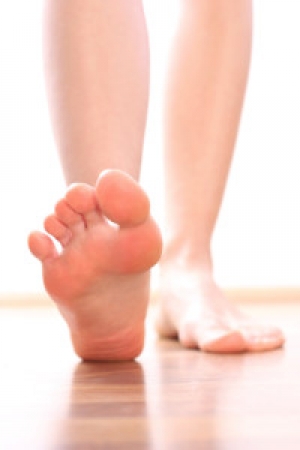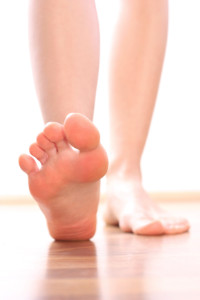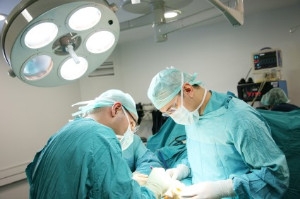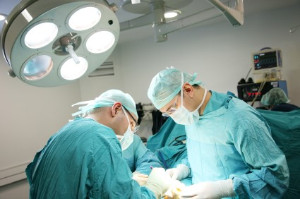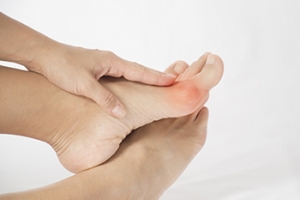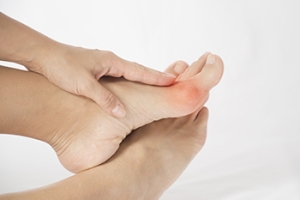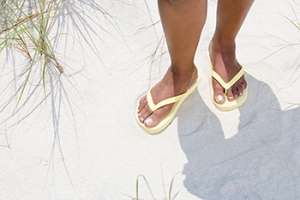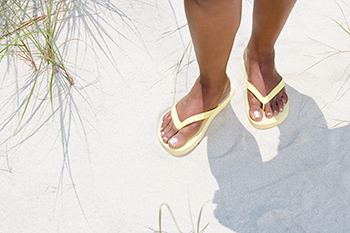Items filtered by date: April 2021
What to Do If Your Child’s Feet Sweat Constantly
Hyperhidrosis is a condition where overactive sweat glands cause an individual to sweat excessively in certain areas of the body, including the feet. If your child’s feet sweat profusely—even if your child is not hot or doing something strenuous—or their feet regularly emit an unpleasant odor, they may have hyperhidrosis. This condition can be quite uncomfortable, embarrassing, disruptive to normal activities, and may even make them more prone to developing a fungal infection due to continuously wet skin. Hyperhidrosis can be caused by physical stress or anxiety, certain medications, infections, fever, or even an underlying medical condition. You may be able to help your child manage the symptoms of hyperhidrosis by having them keep their feet clean, applying cornstarch or powder, choosing breathable materials in shoes, and wearing cotton socks that are switched out regularly. If these practices do not offer adequate relief, a podiatrist may be able treat your child’s hyperhidrosis with various procedures and medicinal therapies.
The health of a child’s feet is vital to their overall well-being. If you have any questions regarding foot health, contact Dr. Kenneth Donovan of Advanced Care Foot and Ankle. Our doctor can provide the care you need to keep you pain-free and on your feet.
Tips for Keeping Children's Feet Healthy
- Make sure their shoes fit properly
- Look for any signs of in-toeing or out-toeing
- Check to see if they have Clubfoot (condition that affects your child’s foot and ankle, twisting the heel and toes inward) which is one of the most common nonmajor birth defects.
- Lightly cover your baby’s feet (Tight covers may keep your baby from moving their feet freely, and could prevent normal development)
- Allow your toddler to go shoeless (Shoes can be restricting for a young child’s foot)
- Cut toenails straight across to avoid ingrown toenails
- Keep your child’s foot clean and dry
- Cover cuts and scrapes. Wash any scratches with soap and water and cover them with a bandage until they’ve healed.
If you have any questions, please feel free to contact one of our offices located in Warren, Livingston, and Toms River, NJ . We offer the newest diagnostic and treatment technologies for all your foot care needs.
Wounds That Don’t Heal Need to Be Checked
Your feet are covered most of the day. If you're diabetic, periodic screening is important for good health. Numbness is often a sign of diabetic foot and can mask a sore or wound.
When Is Joint Replacement Surgery an Option?
When damage or disease in a joint does not improve or respond to conservative treatment, joint replacement surgery may be an option to help the patient feel and move better. In joint replacement surgery, damaged or diseased joints are replaced with fabricated parts in an effort to help the joint work better, while relieving pain and increasing or restoring mobility. Joint replacement surgery can typically be performed on many different joints in the body, including the joints in the ankles and big toes. These prosthetic joints can last many years. If you are suffering from joint pain in your feet or ankles, contact a podiatrist to see if you are a good candidate for joint replacement surgery.
In certain cases, in which the patient suffers from extreme pain or damage in a joint, joint replacement surgery may be deemed useful. If you have constant pain in a foot joint, consult with Dr. Kenneth Donovan from Advanced Care Foot and Ankle. Our doctor will assess your condition and provide you with quality foot and ankle treatment.
What Is Joint Replacement Surgery?
Over time, joints wear down; this can be exacerbated by diseases and conditions. Joint replacement surgery, also known as arthroplasty, is when a damaged joint is surgically removed and replaced with a prosthesis. Prostheses, which can be made of ceramic, plastic, or metal, act as joints in lieu of an actual joint. One of the most prevalent causes for joint replacement is arthritis.
Arthritis in the Foot
Arthritis can occur in any joint in the body, including in the feet. Common types of arthritis in the foot are osteoarthritis, rheumatoid arthritis, and gout. The big toe is usually where arthritis occurs in the foot; this is known as hallux rigidus.
Joint Replacement Surgery in the Foot
The most common form of joint replacement in the foot is a first metatarsophalangeal (MTP) joint placement. MTP joint replacement surgery is designed to treat hallux rigidus. Surgery is not intensive, and recovery occurs within one to two months after the procedure has been done. Overall, joint replacement surgery is a safe and effective way to treat pain in the joint of the foot.
If you have any questions, please feel free to contact one of our offices located in Warren, Livingston, and Toms River, NJ . We offer the newest diagnostic and treatment technologies for all your foot care needs.
Is Bunion Surgery an Option?
Patients who are afflicted with a bunion may choose to have surgery that can permanently repair this foot condition. A bunion is defined as a large, bony protrusion that develops on the bottom of the big toe. Common causes for a bunion to form can include genetic factors, or from wearing shoes that do not fit correctly. For severe bunions, many patients consider having surgery repair the affected joint. Additionally, bunion surgery may be successful in correcting the ligaments and tendons that may have shifted from the growing bunion. If you have a bunion, and are considering having surgery performed, it is strongly suggested that a podiatrist be consulted for an in depth discussion about the risks and rewards of bunion surgery.
If you are suffering from bunion pain, contact Dr. Kenneth Donovan of Advanced Care Foot and Ankle. Our doctor can provide the care you need to keep you pain-free and on your feet.
What Is a Bunion?
Bunions are painful bony bumps that usually develop on the inside of the foot at the joint of the big toe. As the deformity increases over time, it may become painful to walk and wear shoes. Women are more likely to exacerbate existing bunions since they often wear tight, narrow shoes that shift their toes together. Bunion pain can be relieved by wearing wider shoes with enough room for the toes.
Causes
- Genetics – some people inherit feet that are more prone to bunion development
- Inflammatory Conditions – rheumatoid arthritis and polio may cause bunion development
Symptoms
- Redness and inflammation
- Pain and tenderness
- Callus or corns on the bump
- Restricted motion in the big toe
In order to diagnose your bunion, your podiatrist may ask about your medical history, symptoms, and general health. Your doctor might also order an x-ray to take a closer look at your feet. Nonsurgical treatment options include orthotics, padding, icing, changes in footwear, and medication. If nonsurgical treatments don’t alleviate your bunion pain, surgery may be necessary.
If you have any questions, please feel free to contact one of our offices located in Warren, Livingston, and Toms River, NJ . We offer the newest diagnostic and treatment technologies for all your foot care needs.
Is Bunion Surgery an Option?
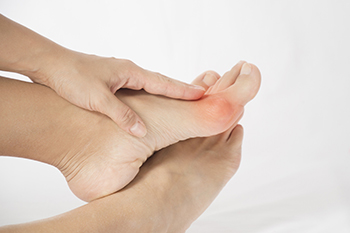 Patients who are afflicted with a bunion may choose to have surgery that can permanently repair this foot condition. A bunion is defined as a large, bony protrusion that develops on the bottom of the big toe. Common causes for a bunion to form can include genetic factors, or from wearing shoes that do not fit correctly. For severe bunions, many patients consider having surgery repair the affected joint. Additionally, bunion surgery may be successful in correcting the ligaments and tendons that may have shifted from the growing bunion. If you have a bunion, and are considering having surgery performed, it is strongly suggested that a podiatrist be consulted for an in depth discussion about the risks and rewards of bunion surgery.
Patients who are afflicted with a bunion may choose to have surgery that can permanently repair this foot condition. A bunion is defined as a large, bony protrusion that develops on the bottom of the big toe. Common causes for a bunion to form can include genetic factors, or from wearing shoes that do not fit correctly. For severe bunions, many patients consider having surgery repair the affected joint. Additionally, bunion surgery may be successful in correcting the ligaments and tendons that may have shifted from the growing bunion. If you have a bunion, and are considering having surgery performed, it is strongly suggested that a podiatrist be consulted for an in depth discussion about the risks and rewards of bunion surgery.
If you are suffering from bunion pain, contact Dr. Kenneth Donovan of Advanced Care Foot and Ankle. Our doctor can provide the care you need to keep you pain-free and on your feet.
What Is a Bunion?
Bunions are painful bony bumps that usually develop on the inside of the foot at the joint of the big toe. As the deformity increases over time, it may become painful to walk and wear shoes. Women are more likely to exacerbate existing bunions since they often wear tight, narrow shoes that shift their toes together. Bunion pain can be relieved by wearing wider shoes with enough room for the toes.
Causes
- Genetics – some people inherit feet that are more prone to bunion development
- Inflammatory Conditions - rheumatoid arthritis and polio may cause bunion development
Symptoms
- Redness and inflammation
- Pain and tenderness
- Callus or corns on the bump
- Restricted motion in the big toe
In order to diagnose your bunion, your podiatrist may ask about your medical history, symptoms, and general health. Your doctor might also order an x-ray to take a closer look at your feet. Nonsurgical treatment options include orthotics, padding, icing, changes in footwear, and medication. If nonsurgical treatments don’t alleviate your bunion pain, surgery may be necessary.
If you have any questions, please feel free to contact one of our offices located in Warren, Livingston, and Toms River, NJ . We offer the newest diagnostic and treatment technologies for all your foot care needs.
Why Flip-Flops Can Be Hazardous to Your Feet
Flip-flops don’t offer the protection or support your feet need. While they may be appropriate for some limited use, they should not be worn for long periods of time. Their flimsy foam soles and lack of structure offer no arch support at all, which causes your feet to flatten and forces tendons and ligaments to compensate. This stress throughout your feet can cause heel spurs, bunions, flat feet, cracked heels and even plantar fasciitis. Additionally, their floppy “fit” makes your toes work harder to keep them on, which can cause hammertoes and put you at higher risk of twisted ankles, stubbed toes, and even trips and falls. If you would like more information about the danger of improper footwear or if you have any discomfort or pain in your feet, contact a podiatrist today.
Flip-flops are not always the best choice of footwear. If you have any concerns about your feet or ankles, contact Dr. Kenneth Donovan from Advanced Care Foot and Ankle. Our doctor will assist you with all of your foot and ankle needs.
Flip-Flops and Feet
When the weather starts warming up, people enjoy wearing flip-flops. Flip-flops are comfortable, stylish, and easy to slip on and off; they're perfect for any summer beach goer. However, these shoes can cause harm to the feet.
How Can Flip-Flops Affect Me Long-Term?
- Ankle problems
- Hip problems
- Lower back problems
- Pain in the balls of the feet
- Problems with foot arches
- Changes in the way you walk
Are There Injuries Associated with Flip-Flops?
Yes. Since flip-flops are relatively weak and do not provide the same amount of support as sneakers, people who wear flip-flops regularly are more susceptible to injuries. On top of that, the open nature of the shoe makes your feet more prone to other problems, such as cuts and even infections. Common injuries and ailments include:
- Sprained ankles
- Blisters
- Infections
- Cuts and Scrapes
I like Wearing Flip-Flops. Are There Safe Alternatives?
When buying flip-flops, try to find ones that have sturdy soles and that are made of high-quality materials that will support for your feet. These flip-flops will cost more but will also last longer as a result.
If you have any questions please feel free to contact one of our offices located in Warren, Livingston, and Toms River, NJ . We offer the newest diagnostic and treatment technologies for all your foot and ankle needs.
